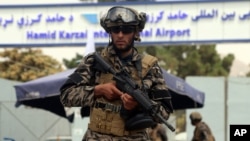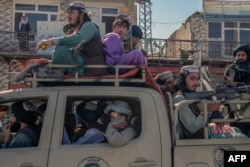The United Nations said Tuesday that it had recorded at least 218 "extrajudicial" killings in Afghanistan and hundreds of other "serious" human rights abuses since the Taliban seized power two years ago.
The victims were allegedly mostly individuals affiliated with the U.S.-backed former government in Kabul, including military, intelligence, and police personnel.
"In most instances, individuals were detained by de facto [Taliban] security forces, often briefly, before being killed," the U.N. Assistance Mission in Afghanistan [UNAMA] said in its new report.
While some were killed in custody, others were taken to undisclosed locations before being killed, with their bodies either dumped or handed over to family members, the report said.
UNAMA documented 800 incidents of extrajudicial killings, arbitrary arrest, torture and enforced disappearance, saying they took place despite a much-touted "general amnesty" by the Taliban for former Afghan officials.
The then-insurgent Taliban retook control of the country on August 15, 2021 as U.S.-led NATO troops withdrew after nearly 20 years of involvement in the Afghan war.
Most of the killings reported by UNAMA took place in the four months after the Taliban took over the conflict-torn country.
Taliban supreme leader Hibattullah Akhundzada announced an amnesty for former government members, including those who fled the country fearing retribution, soon after his group seized power.
"While the introduction of the general amnesty by the de facto authorities was a welcome step, ongoing human rights violations... indicate that the general amnesty has not been fully upheld," UNAMA said.
Taliban spokesman Zabihullah Mujahid swiftly rejected the U.N. charges, saying the general amnesty was being effectively and fully implemented.
He wrote on X, formerly known as Twitter, that relevant authorities had investigated some "personal revenge" incidents involving unknown individuals, but their number was "minimal."
Mujahid alleged that "some sections within the U.N. system ignore ground realities in Afghanistan and always look for adverse developments to spread propaganda."
UNAMA quoted the Taliban-led foreign ministry as disputing the reported violations of the general amnesty, saying it has not received reports of any non-compliance with the order of Akhundzada. It vowed to investigate and bring to justice those guilty of disobeying the decree.
The ministry rejected allegations Taliban forces had detained or tortured any military personnel because of their association with the former Afghan government. However, it acknowledged that action had been taken against those challenging the Taliban government, known as the Islamic Emirate.
"No military staff of the previous administration has been arrested, detained, or tortured because of his activities in the security institutions. Those employees of the previous administration who joined the opposition groups of the Islamic Emirate or had military activities to the detriment of the system have been arrested and introduced to judicial authorities," the ministry said.
The Taliban ministry asked UNAMA to share any "specific and documented claims" about human rights violations to enable security forces to investigate them.
The U.N. high commissioner for human rights, in a statement released with the UNAMA report said its findings presented a "sobering picture" of the treatment of former Afghan government officials.
"Even more so, given they were assured that they would not be targeted, it is a betrayal of the people’s trust,” said Volker Türk. He urged the Taliban to prevent further such violations and hold perpetrators to account.
No foreign government has recognized the Taliban as the legitimate ruler of Afghanistan over human rights concerns and the curbs they have placed on women’s access to work and education.
Taliban Foreign Minister Amir Khan Muttaqi reiterated his allegations Tuesday that Western countries are using the issue of human rights as a “pressure tactic” and an “excuse” to deny international recognition to his government.











